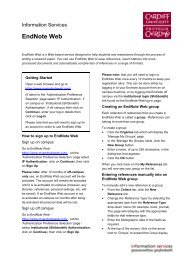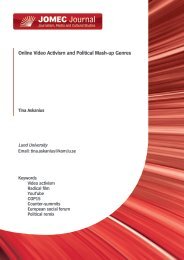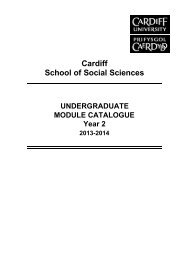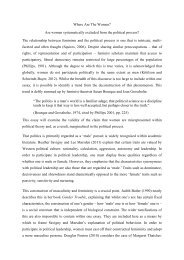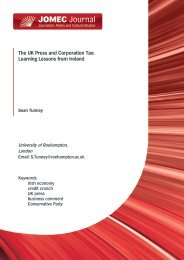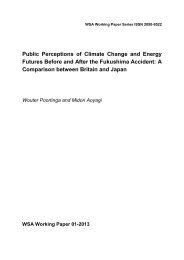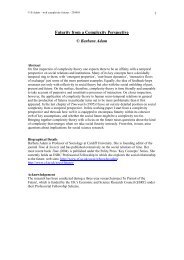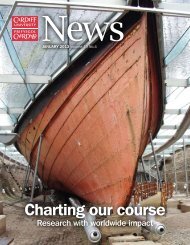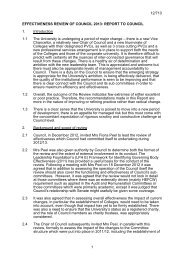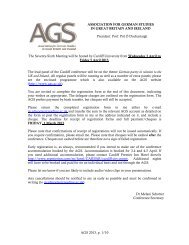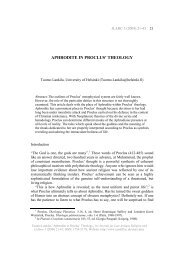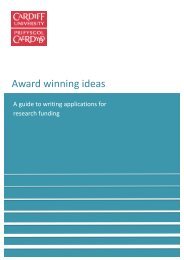Book Reviews - Cardiff University
Book Reviews - Cardiff University
Book Reviews - Cardiff University
Create successful ePaper yourself
Turn your PDF publications into a flip-book with our unique Google optimized e-Paper software.
JLARC 7 (2013) 97-105<br />
100<br />
practices. Still, late-antique philosophy lost some of its clarity and brevity and became<br />
cluttered with all manner of knowledge and wisdom accrued through many centuries of<br />
learning and from many cultures. Clark considers Oswald Spengler’s view that alongside<br />
Classical culture there existed in the late-antique Mediterranean a “Magian” intellectual<br />
culture which introduced emotional, communal and ritual elements into the essentially<br />
rationalist Classical philosophical tradition and thus developed it into a religion. Clark<br />
poses the question whether this pagan philosophical tradition might have been a more<br />
tolerant alternative to the ultimately victorious Christian Orthodoxy, or later, to Islam.<br />
To some extent an answer to this question is given in Chapter Ten, “An end and a<br />
beginning”. Ancient Mediterranean Philosophy was not extinguished, but persisted, if<br />
only as a largely “hidden”, subtle, sublime, phenomenon. Jan Assmann recently coined<br />
for it the phrase religio duplex, a second, subliminal, layer of religion beneath popular<br />
beliefs and practices, the “religion” of those few in every given age who “know” that<br />
popular religion cannot provide final answers and that any belief to be in possession of<br />
the ultimate truth can be no adequate substitute for the honest and persistent pursuit of<br />
truth, the “love of wisdom” (which is the meaning of philosophy), which will never be<br />
complete in this life. Clark shows that in this respect philosophy has probably never held<br />
a dominant position in any society and he poignantly hints at the similarity of the rhetoric<br />
used by a modern scientist, who declares all previous worldviews erroneous and obsolete,<br />
with that of an early Christian Church Father, who presents his own doctrine as a victory<br />
of the enlightenment over the illusions and fantasies of a benighted past.<br />
This relatively brief summary cannot do justice to the rich content of this book, be it<br />
the amount of historical material covered, or the level of philosophical investigation into<br />
individual questions. A brief section recommends further reading (pp. 217-219), and an<br />
extensive bibliography and index of names and subjects conclude the volume.<br />
Ancient Mediterranean Philosophy is a fascinating and highly instructive book, which<br />
can be recommended to any reader at any level, who not only wants to “know about” the<br />
history of philosophy in Antiquity, but in the process of learning about it would also like<br />
to learn how to practise philosophy in their own lives.<br />
Josef Lössl, <strong>Cardiff</strong> <strong>University</strong> (LosslJ@cardiff.ac.uk)<br />
Jörg Trelenberg, Tatianos. Oratio ad Graecos. Rede an die Griechen (Tübingen:<br />
Mohr Siebeck, 2012); x + 308 pp.<br />
The present volume is the most substantial treatment of Tatian’s Oratio ad Graecos for<br />
some time. It offers a newly edited Greek text with an annotated translation (pp. 84-193)<br />
and introductory chapters on the following topics: 1) The author (pp. 1-8), 2) Date and<br />
place of origin (pp. 8-15), 3) The transmission of the work (pp. 15-24), 4) Its Structure<br />
(pp. 25-29), 5) Its Theology (including Creation, Logos speculation, Pneumatology, Demonology,<br />
Anthropology and Ethics, pp. 29-54), 6) Its merits as an Apology (including<br />
polemics against philosophy, mythology and astrology, and defence of the concept of a<br />
“Barbarian Philosophy”, pp. 54-71). In addition there are five appendices: 1) Was Tatian<br />
a pupil of Justin Martyr (pp. 195-203)? 2) Was he a Gnostic (pp. 204-219)? 3) Why is the<br />
name of Christ not mentioned in the work (pp. 219-224)? 4) Who were the addressees of<br />
the work (pp. 224-230)? And 5) What is the genre of the work (pp. 230-240)? The book<br />
concludes with a bibliography and indices of biblical, classical and patristic references,<br />
names and Greek words, ancient and modern authors, and subjects.<br />
<strong>Book</strong> <strong>Reviews</strong> in: Journal for Late Antique Religion and Culture 7 (2013) 97-105;<br />
ISSN: 1754-517X; Website: http://www.cardiff.ac.uk/clarc/jlarc



